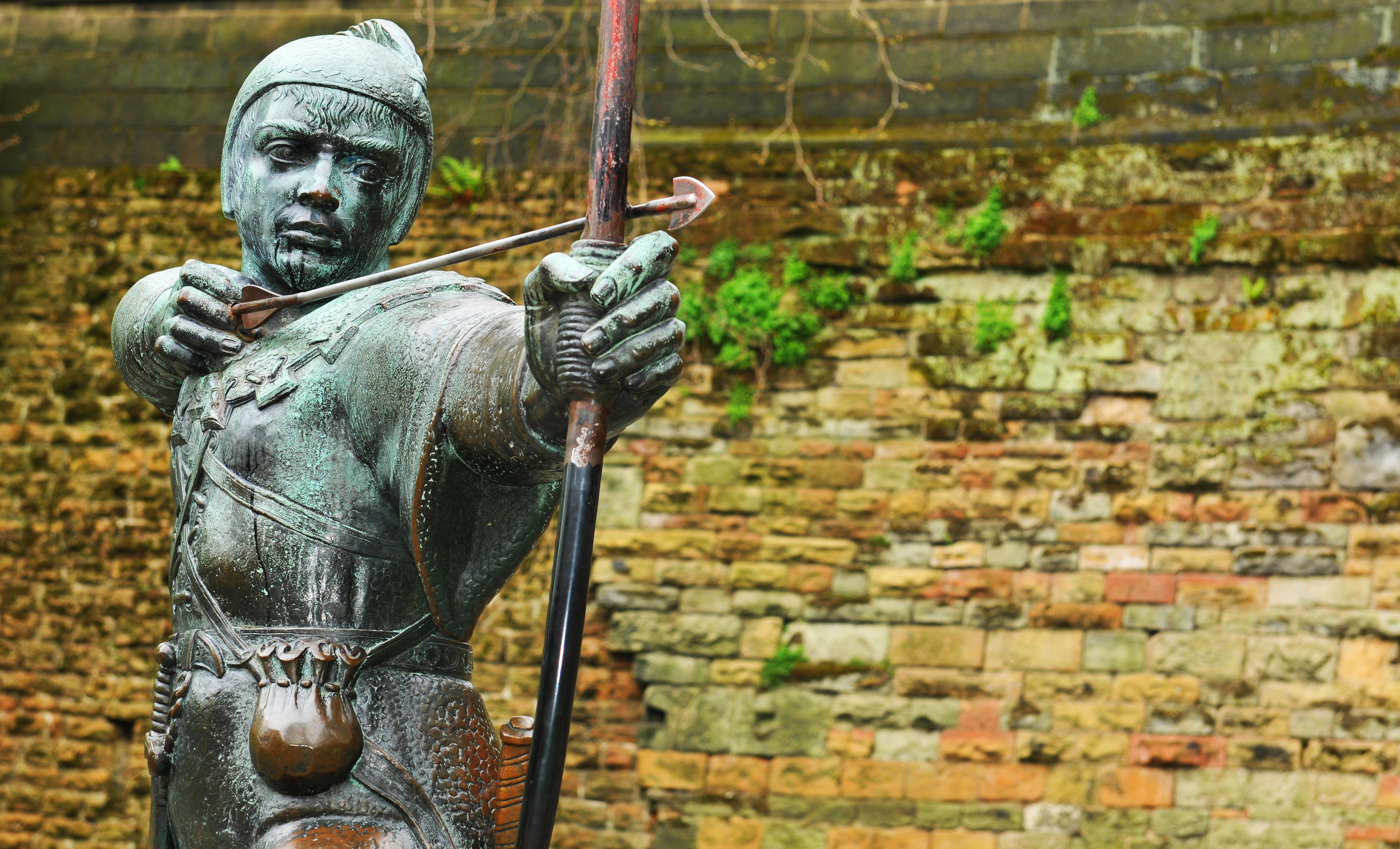By: Jason Benedict
My family and I recently watched a show about Robin Hood. The kids asked me if I thought Robin Hood was heroic. I guess I do, but that takes some explaining.

One reason I like Robin Hood is that according to family lore, he and I have something in common. We both have ancestors who hail from Nottinghamshire, England (The Benedicts supposedly settled there upon fleeing Southern France). In general we love the Robin Hood story because Robin Hood is about justice a balancing of the scales. The evil nobles used the power of force and government coercion (enter prince John and that despicable Sheriff) to extract money and goods from the productive, hardworking, enterprising peasants. They then spend it on their own wasteful, and unproductive (albeit lavish lifestyles). Robin Hood to the rescue! He helps the peasants throw off the weight of oppressive big government.
What I can’t accept is the modern reversal in which government is seen as Robin Hood and the hardworking, enterprising business folks are seen as Prince John. You see the system has changed since feudal England. Dr. Walter Williams says, “Capitalism is relatively new in human history. Prior to capitalism, the way people amassed great wealth was by looting, plundering, and enslaving their fellow man. Capitalism made it possible to become wealthy by serving your fellow man.” You see a free market allows you to get a kind of credit (we call this money: e.g. Dollars) in exchange for rendering service (providing goods and service) to our fellow man. In this system those who become the most proficient at this, amass the greatest number of credits. This proficiency I speak of is not merely time and effort, but it also factors in strategy, wisdom, insight (cleverness), charisma, leadership, etc. We also have corporations on the scene, another relative newcomer in world history. Corporations represent teams of people working in – get this – cooperation, to provide service to their fellow man.
So back to Sherwood Forest – how did Prince John reinvent himself in the 21st century as a government “benefactor” of the people? Let’s look at 3 destructive forms of redistribution of Capital (goods and money):
- An armed robber (perhaps a Meth addict – but at any rate an unproductive and lazy member of society) goes into a local grocery store and using coercion takes money from the small business owner (he is rich after all) – he redistributes this Capital to himself and uses it for his own consumption. The winner – the robber. The loser – all of us.
- The Federal Government uses its overwhelming powers of coercion to take money (unethical but legal) from the same small business owner (he is rich after all) – the government then redistributes this Capital, Some of it is distributed to the less productive members of society, who spend it on their consumption. The winner – the government who is seen as a benefactor and reaps the vote as a reward thus maintaining power. The loser – all of us. Question – are there any incidents in which some good is done with some of this money? Yes, you can find an anecdote here and there of someone who used this “redistributed” money to accomplish some positive end*, but this is a question of efficiency and outcomes. The net result is that we are all worse off, and this is a terribly inefficient way to get some of the money into the right hands.
- The Government uses its ability to borrow and/or print money and (essentially) takes cash from future generations, and in the same inefficient way they redistribute the cash that rightfully belongs to future generations of achievers. They give this capital to the less productive members of society who in turn consume it upon themselves. Questions – but wait a second, when the government spends that money doesn’t it stimulate the economy? Didn’t they teach us in school that there is a multiplier effect on the economy? Don’t we all benefit? Let me give you an analogy – government stimulus spending is like plugging in a fan and using it to blow a windmill generator and using the windmill generator to power a light bulb, to power a solar cell to power the same fan.
So Robin Hood, what is the alternative? Freedom! Allow the free market to use its unrivaled economic efficiency to allocate capital to the most productive members of society. Allow the free market to confiscate capital from the most wasteful and unproductive among us – thus incentivizing them to change their unproductive behavior (so we all win). “If a man does not choose to work, neither shall he eat.” (2 Thessalonians 3:10). Allow philanthropy and altruism to address the problems that can’t be solved by the market, but allow individuals to direct their philanthropy themselves. When someone helps their fellow man of their own accord and with their own means this is virtue. But when someone helps their fellow man (and themselves) with someone else’s means through coercion and against free will this is despicable. When they congratulate themselves for this redistribution it is evil.
*Public Goods: of course there are legitimate uses of taxation for public goods: defense, justice, policing, infrastructure, etc. Things that cannot or should not be allocated by the free market. Though these should be more at the local level than federal with exceptions.
For further insights I suggest that you investigate the writings (or YouTube ® videos if you prefer) of the late Milton Friedman, Dr. Walter Williams and Thomas Sowell.




